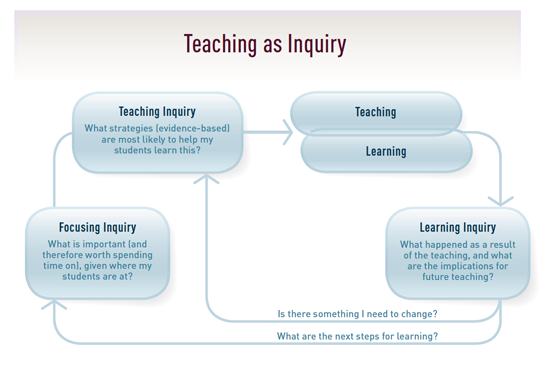Teaching as Inquiry is not a new approach; it is part of effective pedagogy and describes the way good educators plan effective programmes for their learners. This diagram explains it a bit more, and for yet more information follow above link:
In our work with LwDT, our schools and the teacher at these schools apply the TaI process to their practise, asking themselves questions like "How can we use devices to support our students who are not achieving in writing yet?" etc. As facilitators we are asked to set ourselves inquiries relating to our practise also. I have decided that for this year I will make my inquiry very transparent and share my thoughts and findings on my blog. There are a number of reasons for this:
- I can collate everything in one place
- Putting it in writing and out there for anyone to see will make me think a lot harder about it
- The possible audience might keep me on my toes to work on it more regularly.
- My inquiring might inspire other educators to inquire into their practise also
- While I wouldn't say that my way is the perfect way, at least it could model one way to other 'inquirers'.
My topic is Challenging Conversations. I am not a fan of challenging conversations, in fact I would much rather we all just got on with each other. But the reality is we don't, and while there are times when it is better to 'let something go', but when it is about students and their learning we should never let things go. There are a number of occassions in my professional life when I should have had a challening conversation with someone and didn't; it's about time that I did something about this.
At this point in time I am thinking about structuring my inquiry in 3 parts:
- What are challenging conversations? How do they come about, why? How do we decide when to have a challening conversation and when to 'let it go'?
- The conversation itself: When, how, what? How do we prepare ourselves for them - both the person leading and the person responding?
- The 'aftermath': What happens after, in both positive and negative outcomes of that conversation?
I am looking forward to hearing from anyone about their inquiry or about their experience with challenging conversations!

No comments:
Post a Comment
Thanks for visiting, I love to know you were here! Please leave your comment below.